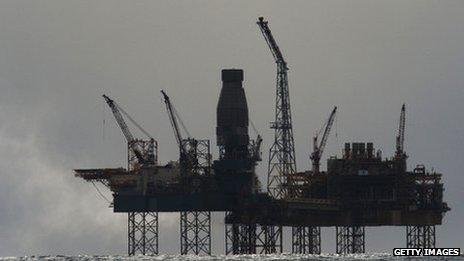Scottish independence: Oil revenues would be 'bonus not basis'
- Published

Mr Salmond says an independent Scotland would reap the benefits from the oil and gas industry
Oil revenues will be a "bonus" but not the basis of the economy in an independent Scotland, the first minister has said.
Alex Salmond made the comments ahead of the publication of a Scottish government paper later this week.
He said Scotland would reap the benefits of a boom in the industry, but be less dependent on oil than Norway.
The UK treasury said independent forecasts showed that oil revenues were set to decline.
The Scottish government paper will set out the future of the oil and gas industry in an independent Scotland.
It will say that, according to industry organisation Oil and Gas UK, North Sea production is likely to reach two million barrels a day by 2017 - a 30% increase on current levels.
The document is the latest in a series of papers and analysis to be produced by both the Scottish and UK governments in the lead-up to the referendum in September 2014.
It will also highlight that the oil industry has already committed £100bn to future investment in the North Sea.
'Huge bonus'
But the first minister has insisted that the Scottish economy will not be based on oil.
Mr Salmond said: "It will be a bonus. If oil is taken out of the equation, then Scotland's economic output per head is almost identical to the that of the UK.
"The benefit we get from oil and gas will be a huge bonus."
The Scottish government said it is estimated there are 24 billion barrels of oil and gas remaining, with a wholesale value of £1.5 trillion.
It has challenged figures produced by the Office for Budget Responsibility (OBR) which recently predicted a downturn in oil and gas production.
The OBR said oil and gas revenues are expected to drop from 0.4% of the UK economy to an almost negligible 0.03% by 2040.
A spokesman for the first minister added: "Westminster government departments have consistently underplayed the value of oil, and the production information from the Department of Energy and Climate Change (DECC), which underpins the OBR figures, is significantly at variance with the industry's.
"For example, DECC's forecasts assume that production remains broadly unchanged at approximately 1.5 million boe (barrel of oil equivalent a year between 2012-13 and 2017-18.
"This is despite the record levels of investment currently observed in the North Sea and forecasts by Oil and Gas UK that production will rise to 2 million boe a day by 2017."
'Volatile resource'
The UK Treasury said Scotland had a "thriving oil industry" that the UK government was supporting to extract "every last drop of oil" through decommissioning, tax reliefs and field allowances.
A spokesman added: "But this support costs money and combined with increased costs of production means that tax receipts are set to decline.
"Credible, independent forecasts like the OBR's show that oil revenues are set to decline to £56bn over the period from 2017-18 to 2040-41. This would leave a significant gap in an independent Scotland's finances.
"Scotland is better off dealing with a volatile resource like oil as part of the larger UK economy, where it is easier to manage both the fluctuations and the projected decline in revenues."
- Published18 July 2013
- Published17 July 2013
- Published7 May 2013
- Published11 March 2013
- Published6 March 2013